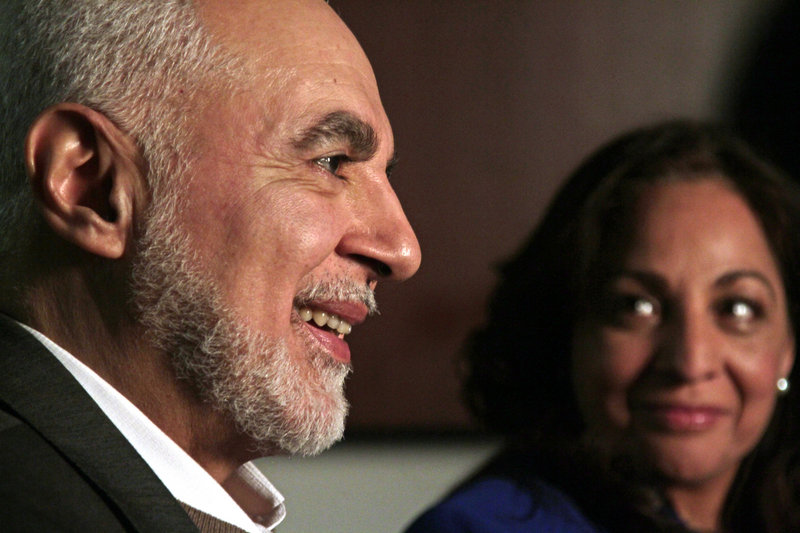NEW YORK – Imam Feisal Abdul Rauf saw his plans for an Islamic center near ground zero derided as a victory mosque for terrorists, exploited as campaign fodder and used as a bargaining chip by a Florida pastor who vowed to burn the Quran.
After that summer of mistrust and raw feeling, he’s looking on the bright side.
Rauf says he hopes to use the platform he gained through the angry debate to turn his small nonprofit group into a global movement celebrating pluralism.
In an interview this week with The Associated Press, Rauf said he hopes to see interfaith centers like the one he plans to include in the downtown Manhattan Islamic center built all over the world. Each would be dedicated to fighting extremism and promoting better relations among people of different faiths and cultures.
Already, he said, he is exploring opening facilities in Indonesia, in Kosovo and in other American cities.
“We went to the brink, in a certain way,” he said of last summer’s tumult. But he added, “This crisis showed us what was possible. It showed us that there is actually hope. Hope for a better relationship between America and the Muslim world, both domestically and internationally.”
Whether there is hope for the proposed center two blocks from the site of the World Trade Center attacks is unclear.
The superheated rhetoric of August and early September has died down, aside from the occasional downtown demonstration, and there appear to be no major governmental obstacles, but the $150 million project still remains on a slow track to construction.
The developer of the site has said groundbreaking is probably three years away. The nonprofit group that would run the center is still being established. A fundraising campaign has yet to begin. Developer Sharif El-Gamal has said he plans to borrow most of the money needed to build by selling a type of bond common in Islamic banking.
The timetable will give Rauf and his wife, the activist Daisy Khan, more time to make their case that a Muslim institution belongs at ground zero. They envision a 13- to 15-story facility with a health club, a day care center and playground, an auditorium for cultural events, art studios and galleries, a 9/11 memorial and a two-level prayer room with seating for a congregation of 2,000.
“We were part of the narrative of 9/11,” Rauf said, noting that members of his own congregation, based about 10 blocks from the Trade Center, were victims of the attacks.
“We have an obligation. We have a responsibility” to participate in the rebuilding of the neighborhood, he said. “This center is an anti-9/11 statement.”
Convincing the country, though, hasn’t been easy.
As city officials declined to block the center, critics, including many prominent Republicans, decried it as a slap in the face to the families of Sept. 11 victims. Newt Gingrich compared the center to Nazis putting a sign next to the Holocaust Museum.
Mayor Michael Bloomberg and religious leaders of many faiths have been among the center’s most ardent supporters. Relatives of 9/11 victims have come out on both sides.
The debate took a bizarre turn when the leader of a small Christian congregation in Florida said he would call off his plans to burn the Quran on the Sept. 11 anniversary if the Islamic center were moved farther from ground zero. Rauf agreed to nothing — not even to meet with Pastor Terry Jones — but Jones still ended up changing his mind about burning Islam’s holy book.
Rauf and Khan said they have begun talking in recent weeks with more relatives of 9/11 victims in an attempt to build support for the center.
Khan said she hoped some would agree to be “part of the healing process” and help design the center’s 9/11 memorial.
The couple are also trying to find a role for themselves in repairing what they see as a rift between U.S. Muslims and the nation’s Christian majority.
Mere acceptance of Muslims in the U.S. is not Rauf’s goal.
“It is not enough for me that you tolerate me,” he explained to an audience in Jakarta last month. “I want you to love me.”
Rauf and Khan have kept their offices for years in the Interchurch Center, a Manhattan office tower packed with Christian religious agencies that was conceived as a space where different denominations could mingle and collaborate.
Rauf and Khan said they prefer to spend their time talking about issues like gender equity and women’s rights within Islam. Khan leads, among other things, an empowerment group that favors a more visible role for women in Muslim cultural, religious and judicial institutions.
The couple say they were shocked by the emotional nature of the opposition to the Islamic center project, and regret they did not anticipate the situation ahead of time. Yet they are also insistent that moving the facility to another location would be a mistake.
Establishing a presence so close to ground zero, she said, would send a powerful message:
“We stand for peace, and peace where it matters the most.”
Send questions/comments to the editors.



Success. Please wait for the page to reload. If the page does not reload within 5 seconds, please refresh the page.
Enter your email and password to access comments.
Hi, to comment on stories you must . This profile is in addition to your subscription and website login.
Already have a commenting profile? .
Invalid username/password.
Please check your email to confirm and complete your registration.
Only subscribers are eligible to post comments. Please subscribe or login first for digital access. Here’s why.
Use the form below to reset your password. When you've submitted your account email, we will send an email with a reset code.